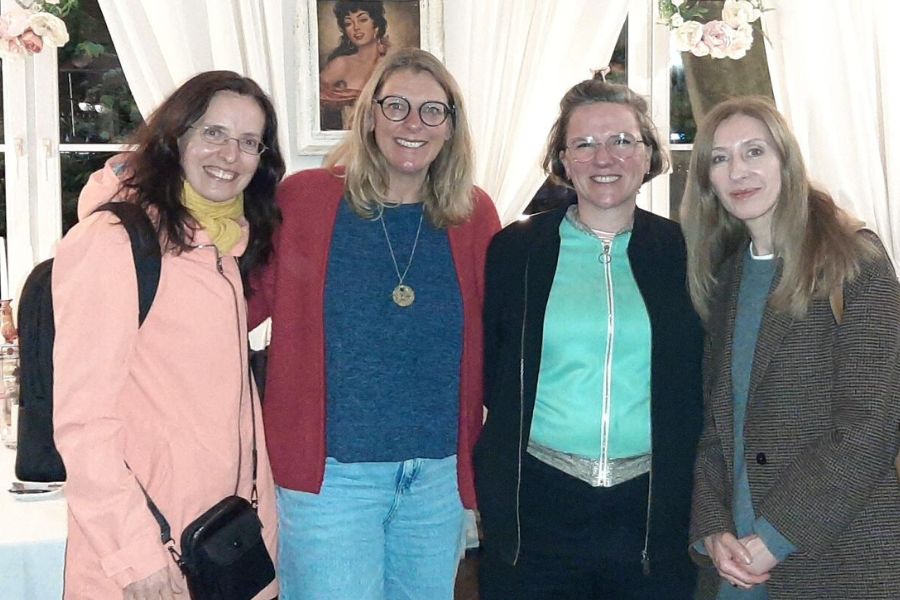Lithuanian Mykolas Romeris University Teaching Visit to Viadrina
On 6-8 May, 2025, Prof. Dr. Sigita Rackevičienė and Dr. Eglė Selevičienė, teachers at the Faculty of Human and Social Studies of Mykolas Romeris University (MRU) in Lithuania, visited the European University Viadrina in Frankfurt (Oder), Germany. Both universities are members of the ERUA Alliance.
On 6-8 May, 2025, Prof. Dr. Sigita Rackevičienė and Dr. Eglė Selevičienė, teachers at the Faculty of Human and Social Studies of Mykolas Romeris University (MRU) in Lithuania, visited the European University Viadrina in Frankfurt (Oder), Germany. Both universities are members of the ERUA Alliance. The main objectives of this ERASMUS+ teaching visit were to deliver lectures on intercultural and linguistic relations and identity and to present the research conducted at MRU HMI to the students and teachers of Viadrina university’s Faculty of Cultural Sciences.

Andrea Gremels
The guest lecture by Prof. Dr. Rackevičienė and Dr. Selevičienė in the MA seminar 'Trauma': Postfascist and Postcolonial Memory Cultures greatly enhanced mutual understanding and exchange between colleagues from the two ERUA partner universities. The session provided an overview of the historical, cultural, and linguistic ties between Germany and Lithuania, including those of the historic traumas of Nazism and Soviet rule in the Baltic region. Drawing on a range of artefacts – including the Quedlinburg Chronicles, Gediminas Letters, grammars and dictionaries of the Lithuanian language compiled by German linguists, the Molotov–Ribbentrop Pact, the Treaty on Lithuanian–German Defence Cooperation, etc. – the discussion addressed both the positive and negative experiences of the Lithuanian people. Therefore, Rackevičienė and Selevičienė also demonstrated how the traumatic ties between Germany and Lithuania can be overcome. A step towards reconciliation was the rediscovery of the 1914 Lithuanian Act of Independence treaty by Liudas Mažylis in a Berlin archive in 2017. Last year's defence cooperation between the two countries supports Lithuania in the face of the current threat of Russian invasion.
Rackevičienė and Selevičienė also demonstrated to students of the Viadrina master program in “Aesthetics – Literature – Philosophy” the importance of literature in preserving national and linguistic identity. Between 1864 and 1904, book smugglers saved Lithuanian literature from the Russian press ban by risking their lives to illegally bring books back into the country from East Prussia. One of the students “found the reference to the ban on the Lithuanian language in the 19th century particularly insightful—an aspect that exemplifies how language policy can function as an instrument of political and cultural oppression and how those affected nevertheless found creative ways to resist the intended eradication of their cultural identity.” Thus, the lecture deepened their knowledge of Lithuania and at the same time sharpened their awareness of the importance of language as part of cultural identity. As one of the students puts it, it illustrated “how strongly individual and collective memory are intertwined – and what role personal narratives can play in understanding historical processes and continuities of traumatic experience”. For the students it was an eye-opening realization, that “historical traumas – such as those caused by the German Nazi occupation or Soviet repression – cannot be viewed in isolation, but continue to have an impact across generations, both privately and socially”.
Rackevičienė and Selevičienė presented current research projects undertaken at MRU Institute of Humanities, including a study on students’ perceptions of artificial intelligence in academic writing and a project on cybersecurity terminology, and also shared personal family stories that reflected the traumatic legacies of both fascist and Soviet regimes. This showed that the wounds of historic violence and oppression are still open and haunting the individual and collective memory of Lithuanians. The lecture offered an impressive contribution to the connection between language, identity, and historical experience of imperial violence and subjugation.
Throughout the visit, Sigita Rackevičienė and Eglė Selevičienė were warmly taken care by their colleagues from the host university, Prof. Dr. Britta Schneider and PD Dr. Andrea Gremels, who learned both about what connects us and what separates us: a shared Indo-Germanic language history, and the painful impact of German fascism on the Lithuanian people. Prof. Dr. Schneider and PD Dr. Gremels were especially grateful to their guests for placing the trust in them and their classroom by sharing traumatic experiences from their own family histories. Hopefully, this academic exchange opened one way towards healing. Everyone expressed their hope that this visit will mark the beginning of a long-lasting and fruitful collaboration between the two ERUA partners.
This article was written jointly by:
PD Dr Andrea Gremels, Chair of Western European Literatures,
Prof. Dr Britta Schneider, Chair of Migration and Language Use,
Students of the MA Sociocultural Studies and the MA Aesthetics - Literature - Philosophy of the Faculty of Cultural Studies,
Prof. Dr Sigita Rackevičienė and Dr Egle Selevičienė, Faculty of Humanities and Social Sciences of Mykolas Romeris University (MRU), Lithuania
Andrea Gremels
Share article: